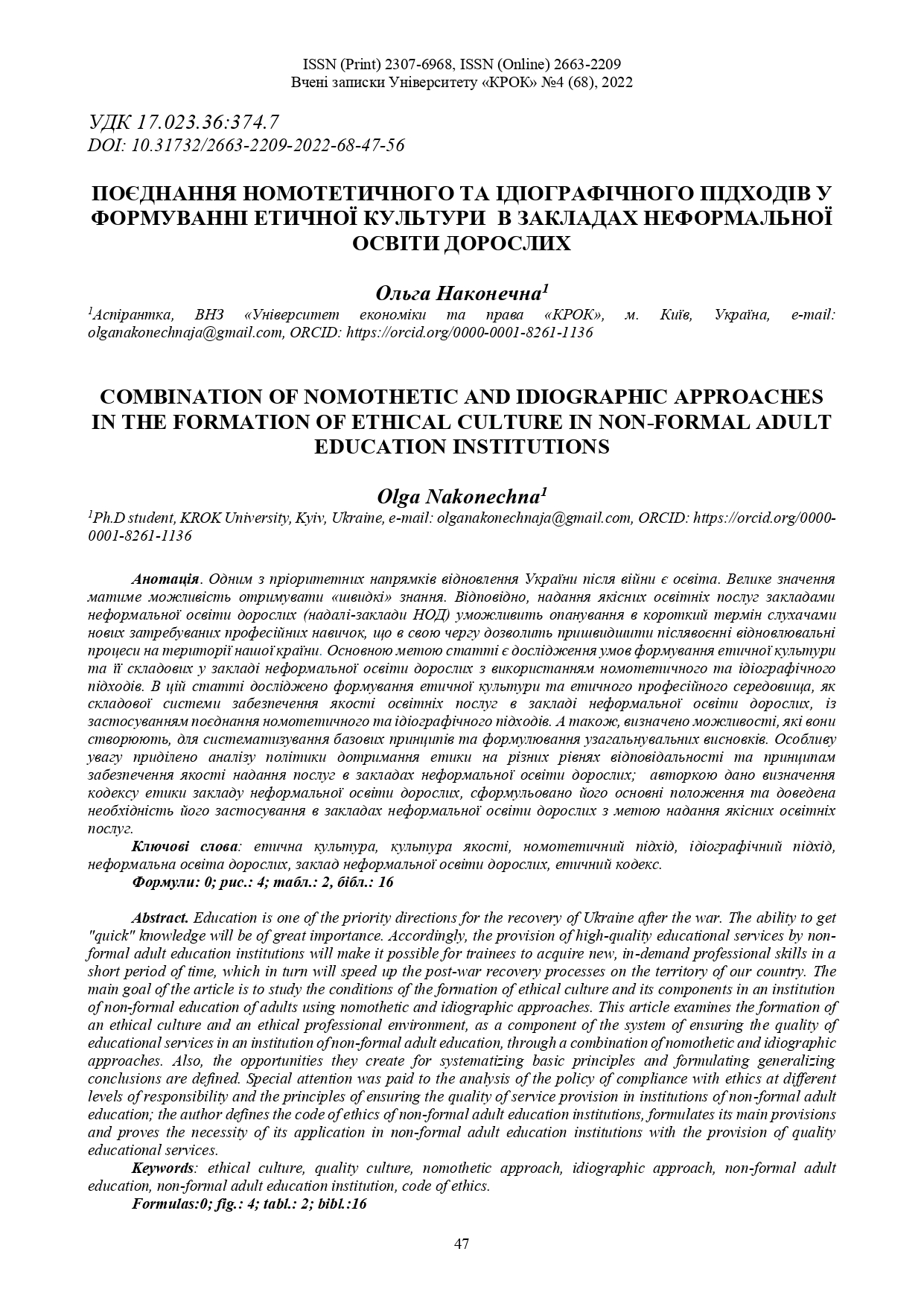COMBINATION OF NOMOTHETIC AND IDIOGRAPHIC APPROACHES IN THE FORMATION OF ETHICAL CULTURE IN NON-FORMAL ADULT EDUCATION INSTITUTIONS
DOI:
https://doi.org/10.31732/2663-2209-2022-68-47-56Keywords:
ethical culture,, quality culture,, nomothetic approach,, , idiographic approach,, non-formal adult education,, , non-formal adult education institution,, code of ethics.Abstract
Education is one of the priority directions for the recovery of Ukraine after the war. The ability to get "quick" knowledge will be of great importance. Accordingly, the provision of high-quality educational services by non-formal adult education institutions will make it possible for trainees to acquire new, in-demand professional skills in a short period of time, which in turn will speed up the post-war recovery processes on the territory of our country. The main goal of the article is to study the conditions of the formation of ethical culture and its components in an institution of non-formal education of adults using nomothetic and idiographic approaches. This article examines the formation of an ethical culture and an ethical professional environment, as a component of the system of ensuring the quality of educational services in an institution of non-formal adult education, through a combination of nomothetic and idiographic approaches. Also, the opportunities they create for systematizing basic principles and formulating generalizing conclusions are defined. Special attention was paid to the analysis of the policy of compliance with ethics at different levels of responsibility and the principles of ensuring the quality of service provision in institutions of non-formal adult education; the author defines the code of ethics of non-formal adult education institutions, formulates its main provisions and proves the necessity of its application in non-formal adult education institutions with the provision of quality educational services.
Downloads
References
Лагодієнко В.В., Каламан О.Б., Пурцхванідзе О.В. (2020). Особливості методології наукового дослідження сфери управління. Бізнес-навігатор, № 5 (61), с. 77–83. Режим доступу: http://www.business-navigator.ks.ua/journals/2020/61_2020/14.pdf.
Бойченко Н. (2012). Етика особистісної комунікації в освітньому процесі. Схід, № 4 (118), с. 121-125. Режим доступу http://dspace.nbuv.gov.ua/handle/123456789/62541.
Товканець Г. В. (2015). Етика взаємин та етичний кодекс в організаційній культурі вищого навчального закладу. Професійна освіта: методологія, теорія та технології. Вип. 2. С. 216-227. Режим доступу: http://nbuv.gov.ua/UJRN/profe_2015_2_19.
Стадний Є. (2021). Деякі рекомендації щодо впровадження етичних кодексів в українських вищих навчальних закладах. Режим доступу: https://uu.edu.ua/upload/Osvita/Upravl_yakistyu_osviti/rekomendazij.pdf.
Лунячек, В.Е., Лунячек, Н.О. (2013). Етична складова як умова ефективного розвитку освіти в Україні. Режим доступу: http://surl.li/ehytm.
Хоружа Л.Л. (2012). Етичні основи реалізації завдань неперервної освіти людини. Сучасна початкова освіта: вектори розвитку, с. 288-294. Режим доступу: https://core.ac.uk/download/pdf/33686526.pdf.
Ділова етика як основа бізнесу/Освіта.UA-2010. Режим доступу: http://ru.osvita.ua/vnz/reports/culture/10766/
Лук`янова, Л. Неформальна освіта дорослих, як невід`ємна складова освіти впродовж життя. Режим доступу: http://www.uaod.org.ua/data/PRO_OSVITU_DOROSLYH/unformal_OD.PDF
Європейський порядок денний для навчання дорослих. Режим доступу: https://drive.google.com/file/d/1mvOVG7YIfMFApk 2maCZyv-LNZVoKqry2/view
Лук’янова Л.Б. (2011). Концепція освіти дорослих в Україні. Ніжин: ПП Лисенко М.М.,. 24 с. Режим доступу: http://nbuv.gov.ua/UJRN/OD_2011_3%281%29__3.
Проєкт Закону України від 10.02.2022 № 7039 «Про освіту дорослих». Режим доступу: http://w1.c1.rada.gov.ua/pls/zweb2/webproc4_1?pf3511=73746.
Закон України «Про освіту» № 2145-VIII. Відомості Верховної Ради (ВВР). 2017, № 38-39, ст.380. Режим доступу: https://zakon.rada.gov.ua/laws/show/2145-19#Text
Стандарт ISO 21001:2018 «Система управління освітніми організаціями». Режим доступу https://www.iso.org/standard/66266.html
Гончарук А. (2012). Неформальна освіта дорослих в країнах ЕС. Педагогічні науки, №54. Режим доступу: http://dspace.pnpu.edu.ua/bitstream/123456789/964/1/Goncha.pdf
Чайка Г. Л. (2011). Культура ділового спілкування менеджера : навчальний посібник. Київ: Знання. 445 с. Режим доступу: http://dspace.wunu.edu.ua/bitstream/316497/25599/1/ 265.PDF.
IAU-MCO Guidelines for an Institutional Code of Ethics in Higher Education. Режим доступу: http://ethicscodescollection.org/ detail/ba1485a2-0116-4455-b7d10ad8cc089930

Downloads
Published
How to Cite
Issue
Section
License
Copyright (c) 2022 Ольга Наконечна

This work is licensed under a Creative Commons Attribution 4.0 International License.

